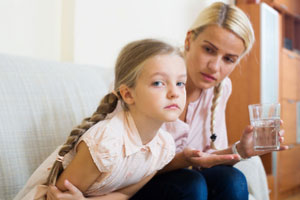Divorce is a challenging experience for everyone involved in the process. It can lead to many difficult choices, with many of them having a significant impact on child custody. When divorce presents significant obstacles, it can be easy to overlook the impact it may be having on your children. One of the most difficult parts of divorce is ensuring that the decisions you make in the divorce process are based on the best interests of your children as well as the benefits they may provide for each parent. Understanding and addressing some of the common fears children have when it comes to divorce can be an effective way of addressing your child’s concerns throughout each stage of the divorce so that each individual can emerge from divorce in a positive and productive way.
The Divorce is Their Fault
A common reaction of many children involved in the divorce process is that the divorce has occurred as a result of their actions. Many children believe that they are the root cause of issues that develop between their parents and this can result in significant negative consequences. Children who believe divorce is their fault are at risk for depression and other issues that can negatively impact their self-esteem. As such, it is important to assure children that divorce is not their fault, even children who do not seem to outwardly blame themselves.
Accepting and internalizing blame is a normal way for many people to deal with the anxiety that results from a stressful situation. That is one of the reasons why so many children experience this stage. While no parent will magically be able to relieve a child of these thoughts, having an open and frank discussion that is appropriate to the child’s age about the divorce is one important step in helping children understand that it is not their fault.
Clear communication with every party involved in a divorce is important for those parties and for you. This is especially true when it comes to children. You may want to use various aids like books on divorce targeted to the age of your child or children. These types of approaches can help children understand the divorce on several different levels and can also help them understand that they are not alone in feeling the way that they do. By listening to your child’s needs and addressing concerns as they arise, you can create an effective plan to help your child understand that he or she is not the reason for the divorce.
They are Being Forced to Choose
Many children end up believing that they are being forced to choose between their parents as a result of the divorce. This is especially true in cases in which custody becomes a contentious issue between parents. Parenting plans may significantly reduce the amount of time a child might be able to spend with one parent to accommodate for educational concerns or other issues that require certain parenting arrangements. In some cases, a child may even be asked what his or her preference for custody is, and that can be overwhelming.
No matter how hard you try to simplify things like holidays and parenting schedules, these are inherently complicated aspects of co-parenting. They will always have some stress and tension attached to them, especially during the transition phase in which each party, including the children, attempts to adjust to new arrangements. However, no matter how difficult the period of adjustment might be, it is extremely important for parents to do everything that they can to maintain and strengthen their relationships with their children.
This includes refraining from negative comments about the other parent as much as it includes planning meaningful experiences to share with your child. It also includes aspects of clear and open communication where each parent encourages the child’s relationship with the other parent and parents take a unified approach to explaining aspects of the divorce and/or custody that could be challenging for a child.
Their Parents Hate Each other
Divorce is not a fun experience. No matter how good of terms you are on with your soon-to-be ex-spouse, it is nearly impossible to keep tension out of a divorce. In situations in which communication is difficult or even impossible, such tension is even more noticeable. It is important to keep in mind that children are always watching and listening, so while negative aspects of a divorce may be unavoidable, how parents choose to handle these issues is often more important.
Conflict between parents will spread to anyone else involved in a divorce, including children. Keeping conflict at a minimum is an important step in preventing this side effect. An experienced Florida divorce attorney can help you anticipate challenges you might face when it comes to divorce so that if conflict does arise, you are more equipped to handle it productively. There are likely to be disagreements down the line in aspects of your divorce settlement, including disagreements about your co-parenting approaches. Having an effective and detailed parenting plan in place can help avoid unnecessary conflict and address it when it cannot be avoided.
Communication and Legal Advocacy
While courts often require parents to complete co-parenting courses as part of the divorce process, many of the tools for helping children cope with divorce are already available. Both communication and legal advocacy are important components of every divorce, and they can play an even larger role when children are involved. By ensuring that you are open and clear about your expectations throughout the divorce process, you can help make divorce easier on your children as well as on yourself. Often, working with an experienced Florida divorce attorney who focuses on working with clients facing divorce is an important first step in the divorce process. If you are considering divorce and have questions about how it might affect your children as well as the role your children might play, contact Scott J. Stadler to schedule a consultation today.

